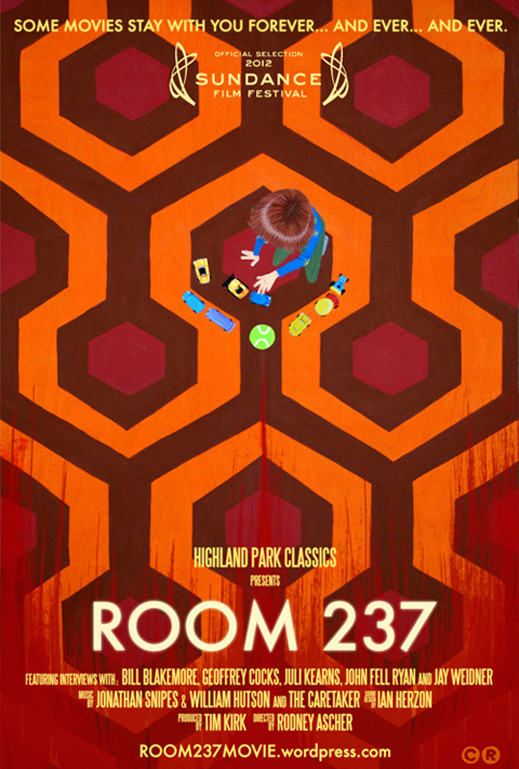
Nordling here.
I admire Stanley Kubrick immensely as a filmmaker. But he’s not exactly the easiest director to embrace. There’s very little touchy-feely in his movies, and even in a film as optimistic as 2001: A SPACE ODYSSEY, the only true character in the movie is a faceless machine. That said, 2001 and DR. STRANGELOVE are among my very favorite films.
THE SHINING is not. I’m likely going to take it on the chin here, and I have many friends and colleagues who adore the film, but it’s never been a favorite of mine. For one thing, I vastly prefer the Stephen King novel. I think it’s a pretty tough book, written by a man who was wrestling with some pretty harsh demons himself (namely drugs and alcohol), and the book is more of a tragedy than anything else. Jack Torrance is one of King’s most tragic figures – a good husband and father, with some failings as a parent and as a man but trying his hardest to do the right thing. Then the hotel breaks him and makes him into its puppet, but the whole thing is a metaphor for the crippling drive of addiction. The fact that at the time King was struggling with those issues makes the book even more poignant.
Stanley Kubrick’s movie, on the other hand, tosses aside such emotion. I can respect Kubrick’s intentions to make the movie that he wanted to make, even if I still feel that the end product is sterile and cold. I admire what Kubrick did with it even if I don’t particularly enjoy the movie very much. John Alcott’s amazing use of Steadicam and the stunning cinematography makes it feel like we are ghostly spectators to the horrors within, almost as if we’re culpable in the violence. Jack Nicholson is very good, even though it’s practically predestined in the opening shots that this is a man who only needs the slightest push before taking axe to his loved ones. The path of Jack in King’s book isn’t meant to be quite so obvious.
I’m happy to be wrong, however – it’s been a few years since I’ve sat down to THE SHINING, but I guarantee that if you see ROOM 237 you’ll want to put it in pretty damn quick. ROOM 237 isn’t a documentary on THE SHINING so much as it is color commentary – it’s an obsessive’s look at the film, and it speculates widely on Kubrick’s intentions in making it. Hardly any of the commenters – ABC reporter Bill Blakemore, Albion College’s Professor of History and Kubrick enthusiast Geoffrey Cocks, author Juli Kearns, fellow Kubrick obsessive John Fell Ryan, and documentarian Jay Weidner – really dive into the actual story of THE SHINING. Instead, they look for the messages between the shots, of what Kubrick was really trying to say with his movie, and the hidden messages that permeate the film.
As it stands, though, ROOM 237 is a bit of a slog – the movie relies on testimony from these people and their ideas and theories sound like the ravings of eccentrics, to put it mildly. One calls THE SHINING an allegory for the genocide of the American Indian. Another sees a film about the Holocaust. Some of their conclusions seem at best spurious, and then one particular segment in the middle of the movie definitely had me considering a piece of history that I frankly would have never given the time of day in my mind, until I saw how the commenter put the pieces together to say that THE SHINING is conclusive proof that Stanley Kubrick helped the United States government fake the moon landing. Yes, you read that right, and what’s even crazier is that he’s almost convincing.
Much of ROOM 237 is like that, forcing even avowed fans of the movie to examine it in different lights. ROOM 237 is dry and clinical – at times much like Kubrick himself – and I’d imagine he’d probably get a chuckle or two at some of the conclusions that these people come up with. Or he might have said that they nailed it. It did cause me to reexamine the movie in ways I’d never considered before. When the onscreen gaffes are pointed out, I will say I was surprised – Kubrick is one of the most meticulous directors to have ever lived, and the idea of continuity errors and mistakes in a Kubrick movie seems outlandish. Were those mistakes intended? The commenters seem to think so, and I have to conclude that I do too.
ROOM 237 is probably only for die-hard SHINING fans – casual moviegoers will drop out after the first half-hour, I’d imagine – but those fans will enjoy the places that the movie goes even if they don’t agree with the conclusions. I still think that THE SHINING is a lesser movie in Kubrick’s film catalog, but ROOM 237 tells us that even lesser Kubrick movies shouldn’t be arbitrarily dismissed.
